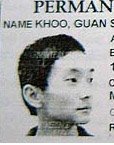Match Point (2005)
The brilliance of Woody Allen's narrative about a social climber does not become apparent until the end of its second Act. The film opens with a thesis statement on how luck determines men’s fortunes though seldom acknowledged as so; over narration, the spare visuals show a tennis ball volleying back & forth, in slow motion, across a stationary net. Prior to the fade-out, the ball hits the top of the net and a  freeze frame captures the event in mid-air as the narrator expounds on the two possible outcomes. In the middle of the final Act, an analog of this scene, now a ring as the projectile hitting a guard rail when the river was its intended goal, finds new meaning within the story, one that doesn’t appear to favor our amoral protagonist. With steady pacing and patient construction up to this high point, the film then fires successive plot points into a finale executed with the precision of the concluding movement of a classical symphony.
freeze frame captures the event in mid-air as the narrator expounds on the two possible outcomes. In the middle of the final Act, an analog of this scene, now a ring as the projectile hitting a guard rail when the river was its intended goal, finds new meaning within the story, one that doesn’t appear to favor our amoral protagonist. With steady pacing and patient construction up to this high point, the film then fires successive plot points into a finale executed with the precision of the concluding movement of a classical symphony.
Match Point is a formal, classy flick. Many will no doubt identify it as a thriller even though such genre elements are mostly visible only in its last 30 minutes. I suppose most thrillers feature a plot that showcases the tense portions or “final-hour” of its story (Mann’s Collateral comes to mind), but Match Point is distinctive in that it is complete with most of its backstory and the build-up towards the final action. Andrew Sarris (in the New York Observer) drew a comparison between this film & Allen’s earlier Crimes & Misdemeanor, which is both more humorous and serious at the same time. Match Point is different, more stately and, perhaps, feels more cosily European than any of his other films. It’s more Chabrol than Hitchcock; philosophically speaking, it poses existentialist dilemmas instead of resolving conflicts with a conventional moral sensibility. This film ranks amongst Allen’s best films, a list that includes Annie Hall, Manhattan, Crimes & Misdemeanor, and Deconstructing Harry.
